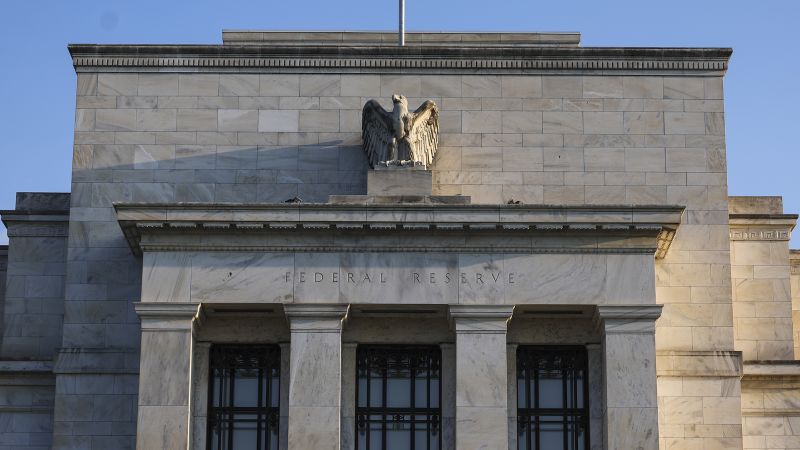Weekly jobless claims in the US fell by 11,000 to reach 239,000, indicating a tight labor market despite a slowdown in job growth and raising the risk of the Federal Reserve increasing interest rates.
The U.S. Bureau of Labor Statistics has revised down its tally of total employment in March 2023 by 306,000, indicating that there were about 300,000 fewer job gains during April 2022 to March 2023 than initially estimated, which could impact the Federal Reserve's decision on interest rates.
Royal Bank of Canada (RBC) plans to cut about 1,800 jobs and warns of a softer economy ahead as it beats analysts' estimates for the third quarter.
The number of open jobs in the US dropped to its lowest level in over two years in July, signaling a slowdown in the labor market, with economists expecting a further decrease in labor demand and a possible response from the Federal Reserve.
The number of job vacancies in the US dropped in July, indicating a cooling labor market that could alleviate inflation, while fewer Americans quit their jobs and consumer confidence in the economy decreased, potentially impacting consumer spending; these trends may lead the Federal Reserve to delay a rate hike in September.
Job creation in the US slowed in August, indicating that the strong economy could be starting to weaken under pressure from higher interest rates. Private employers added 177,000 jobs, well below the previous month's total of 371,000. Pay growth also slowed, suggesting more sustainable growth as the effects of the pandemic recede. Investors and economists remain uncertain about the future of US inflation and whether the economy can continue to grow without a significant slowdown.
The August jobs report is highly anticipated as investors assess the health of the labor market amidst rising interest rates and inflation, with projections indicating an increase in hiring and a steady unemployment rate, but potential disruptions from ongoing strikes and bankruptcies could affect the data. The report is closely watched by the Federal Reserve for signs of labor market softening as they grapple with inflation, and while the labor market has remained tight, there are indications of a gradual slowdown. Job openings have decreased, along with resignations, pointing to a labor market that is cooling.
The US added 187,000 jobs in August, but the unemployment rate rose to 3.8 percent, indicating a plateau in the labor market as the Federal Reserve considers another interest rate hike.
The Federal Reserve is expected to cut interest rates by about one percentage point next year as economic growth slows and unemployment rises, according to chief economists at major North American banks.
US stock futures fell and Treasury yields surged after the September jobs report revealed that the economy added twice as many jobs as expected, increasing anticipation for another rate hike from the Federal Reserve.
The US economy added 336,000 jobs in September, surpassing economist predictions and causing a slight dip in the price of bitcoin, while stock and bond prices continue to decline.
Employers added 336,000 jobs in September, exceeding economists' predictions, signaling a stronger labor market and raising concerns that the Federal Reserve may need to raise interest rates further to control inflation.
The US economy added 336,000 jobs in September, exceeding expectations, but investors are concerned about the prospect of higher interest rates, causing stocks to slump and bond yields to surge.
The US economy added 336,000 jobs in September, surpassing economists' expectations, raising concerns that the labor market may not cool as fast as the Federal Reserve desires in their battle against inflation.
The U.S. economy added 336,000 jobs in September, surpassing expectations, prompting concerns about the need for further measures to slow down the economy and control inflation.
The US economy added 336,000 jobs in September, surpassing expectations and leading to concerns about higher interest rates and inflation, causing the dollar to rise and stocks to fall.
U.S. employers added 336,000 jobs in September, potentially strengthening the case for another interest rate increase by the Federal Reserve, despite wage growth remaining muted and upcoming inflation data expected to show continued slowing.
U.S. employers added 336,000 jobs in September, surpassing expectations, but the strong job growth could complicate the Federal Reserve's efforts to control inflation.
The Washington Post is cutting 240 jobs, or around 10% of its workforce, through voluntary buyouts due to an overly optimistic projection of growth in readership, subscriptions, and ads in the past two years.
The US economy added an impressive 336,000 jobs in September, indicating its resilience and suggesting that higher interest rates are here to stay, which could potentially lead to a new bull market for risk assets and cryptocurrencies.
